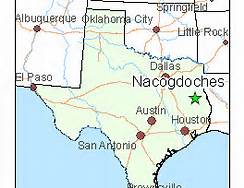While I am a proud University of Texas alumnus, I spent my final semester (Fall 1975) at Stephen F. Austin State University. The strange reason for my move from Austin to Nacogdoches is best left unsaid. UT was bigger, richer and more prestigious in every way, but I am glad I went to SFA. Things turned out well. Located in the piney woods of east Texas, it had an enrollment of 10,000—less than a quarter of UT—and a relaxed ambience. I lived in an old two-story wooden house at 200 Wettermark Street, formerly home to a rich family, although many years earlier it had been subdivided and rented out to students. I paid $50 per month. Coeds with whom I consorted in those carefree days had the names of Debbie,  Diane, Linda, Nelda and Kitt. I wonder where they (other than Linda, who has succumbed to nature’s demands) are now.
Diane, Linda, Nelda and Kitt. I wonder where they (other than Linda, who has succumbed to nature’s demands) are now.
Six months in east Texas
I had two jobs during my six-month sojourn in “Nac,” first with a ground-keeping crew run. I, along with some country boys, mowed grass at Oak Grove Cemetery and other places. Once the semester started, I washed dishes at The Hungry Toad, a hamburger joint on the edge of campus. I took five courses, all but one of which pertained to history. Among them was a Texas history course taught by Dr. Archie McDonald. He was an entertaining man who sometimes came to class dressed up as a historical figure. I remember him in the guises of David Crockett and Sam Houston. He noticed me because I was one of those rare students who often raised his hand and asked questions or sought further explication of a topic.
I thought then, and still do, that Dr. McDonald was the best history professor I ever had. No offense to those guys and gals on the faculty at UT, but they ranged from good to OK to mediocre to terrible. And by the same token, you will occasionally find a diamond in the most unexpected place.
Toward the end of that semester, I went to his office and asked—either in the name of liberal humanism or human liberalism, I forget which—that he let me skip the final exam since I was a graduating senior. Perhaps he was amused by such a brash request because he allowed me to do so.
A regrettable mistake
 I had at that time been a college student for 4 1/2 years and thought I was in dire need of a break. In fact, I should have stayed right there at the house on Wettermark, in Nacogdoches, at SFA but having entered graduate school. Among all the mistakes I have made in my life, few have been bigger than this. I had found the right professor and should have begun working toward a master’s degree in history. To be under the wing of Dr. McDonald would have been immensely beneficial. As editor of the East Texas Historical Journal, surely he could have used an energetic and dedicated grad student to help him with mundane tasks. In return, I would have learned not only the substance of history but research methodology.
I had at that time been a college student for 4 1/2 years and thought I was in dire need of a break. In fact, I should have stayed right there at the house on Wettermark, in Nacogdoches, at SFA but having entered graduate school. Among all the mistakes I have made in my life, few have been bigger than this. I had found the right professor and should have begun working toward a master’s degree in history. To be under the wing of Dr. McDonald would have been immensely beneficial. As editor of the East Texas Historical Journal, surely he could have used an energetic and dedicated grad student to help him with mundane tasks. In return, I would have learned not only the substance of history but research methodology.
At any rate, I left without so much as a fare-the-well. More than 30 years had passed and I had moved to Korea before I thought of Googling the man and re-establishing contact. He claimed to remember me, although I wonder if that were true; he must have had thousands of students pass through his classroom. Via e-mail, I wasted no time in recounting those long-ago days in east Texas and how I should have embraced him as my academic mentor.
When I first returned to the USA, in the summer of 2009, I included Nacogdoches on my itinerary. The old house on Wettermark had been razed (as had The Hungry Toad), but Dr. McDonald was still working as a professor emeritus. On a rainy night, we went to a restaurant on North Street. The main topic of conversation was him and his career. I urged him to tell me where he had come from and why he had stayed at SFA for so long. Maybe a bit flattered, he told me how he had grown up as a middle-class kid in Beaumont, got a degree  from his hometown Lamar University, then a master’s from Rice and a Ph.D. from Louisiana State. Dr. McDonald came to Stephen F. Austin in 1964 and basically never left. His wife, Judy, had spent eight years as the mayor of Nacogdoches.
from his hometown Lamar University, then a master’s from Rice and a Ph.D. from Louisiana State. Dr. McDonald came to Stephen F. Austin in 1964 and basically never left. His wife, Judy, had spent eight years as the mayor of Nacogdoches.
Big fish
He explained how he could have remained at LSU or taken a position at a larger institution but that SFA felt like home. “Big fish in a small pond?” I asked him. He did not disagree. The good doctor, whose CV ran seven pages, was a much bigger fish than I imagined. Other than teaching and running the ETHJ, he had authored or co-authored 21 books and edited the same number. He wrote a weekly column in the Nacogdoches Daily Sentinel for 25 years, did popular pieces for National Public Radio and was a key player in various Texas historical associations. SFA had given him just about every award possible.
More proof of Dr. McDonald’s status came after his death on August 16, 2012. I knew he had been sick for a while and the recent news from his long-time secretary, Portia Gordon, had not been promising. The SFA Student Center’s Grand Ballroom (site of the Archie McDonald Speaker Series since 2010) was packed for a memorial service in his honor. There were segments on the local television station and in the newspaper in which so many of his articles had been printed. A piece in the op-ed section was entitled, “Thank You, Archie, For Gracing Our Lives.”
I did not get a chance to say a final goodbye to this superb educator, but I take comfort in knowing that I told him—repeatedly—that he was the best history prof I ever had and I wish I’d been wise enough to stay in Nacogdoches for another 18 months to get that MA and learn from him. He will be sorely missed at Stephen F. Austin State University and beyond.


2 Comments
A wonderful story!
Thank you, Sue.
Add Comment